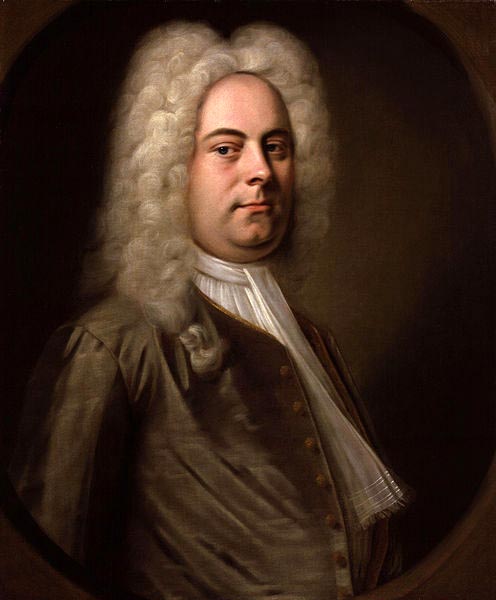 |
| George Frideric Handel (Wikipedia) |
Note: Though he was born in what is now Germany, George Frideric Handel rose to fame in England. Learn how he entertained two English kings with his compositions.
Get Ready: What do you think composition entitled Music for the Royal Fireworks might sound like? Hum it!
George Frideric (or Frederick) Handel, one of the greatest of all British composers, lived at the same time as Sir Isaac Newton. He was born in what is now Germany in 1685--the same year as Bach--and became an English citizen in 1727. Between then and his birth, he had studied music in both Germany and Italy, especially opera.
His first biographer wrote that his road to musical fame and fortune was not a smooth one. He "had discovered such a strong propensity to music, that his father who always intended him for the study of the civil law, had reason to be alarmed. He strictly forbade him to meddle with any musical instrument but Handel found means to get a little clavichord privately convey'd to a room at the top of the house. To this room he constantly stole when the family was asleep."
While on a trip, he gave a sudden performance of the talents he had developed. This so surprised his father that he gave permission for the boy to take proper lessons.
Around age 25, Handel began working for a German prince who four years later became King George I of Great Britain and Ireland. Handel settled in England, where he wrote his most celebrated works. One of these, Zadok the Priest, has been played at the coronation of every British monarch since that of George II in 1727.
Of his three most famous works, one was first performed on a barge floating up the Thames near King George's own barge on July 17, 1717. It is called, appropriately, Water Music. The king liked it so much he ordered it repeated at least three times on the journey up and back down the river.
Another famous work is called Music for the Royal Fireworks. It was played at a fireworks display ordered by King George II, the old king's son, in 1749. The display and the music celebrated the end of a series of European wars and the signing of a peace treaty.
And the most famous of Handel's works was his Messiah, first presented between these two in 1742, in Dublin, Ireland. It is an oratorio--like an opera but one in which the performers stand and sing, without acting. The chorus sung at the end of Part II is widely known for its joyful "Hallelujah!"
Handel died in 1759 at age 74 in London, nearly blind but incredibly wealthy, and was buried in a place of honor in Westminster Abbey after a full state funeral.
--------Read more: https://en.wikipedia.org/wiki/George_Frideric_Handel
Practice: Match the term to its definition below:
- barge
- biographer
- clavichord
- composers
- coronation
- forbade
- funeral
- meddle
- monarch
- propensity
- the ceremony for crowning of a king or queen
- did not allow
- the ceremony before burying a dead person
- one who writes a life story
- a large, flat-bottomed boat
- people who write music
- leaning; inclination; tendency
- be involved with
- an instrument like a piano
- a king or queen
Answers are in the first comment below.
Submitted to the Shenzhen Daily for April 7, 2015


Answers to the Practice: 1. e; 2. d; 3. i; 4. f; 5. a; 6. b; 7. c; 8. h; 9. j; 10. g
ReplyDelete